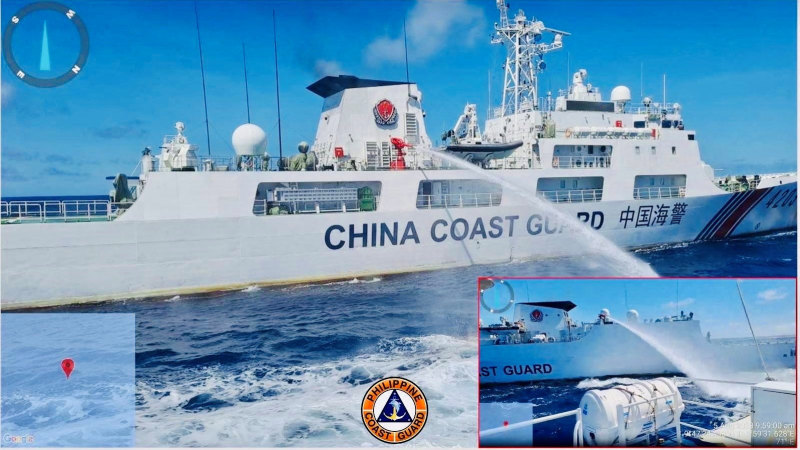Save articles for later
Add articles to your saved list and come back to them any time.
China’s military is becoming dangerously arrogant and is fuelling the risk of a confrontation with the United States by refusing offers to communicate with commanders in the Indo-Pacific, one of America’s most senior military officials has warned.
Lieutenant General Stephen Sklenka, deputy commander of the US Indo-Pacific Command, said he feared that China would seek to establish a military base in Solomon Islands or another Pacific nation as it sought to dominate the region.
The Chinese Coast Guard allegedly used a water cannon against Philippine vessels in the South China Sea.Credit: Reuters
Sklenka added that he saw value in Republican congressman Mike Gallagher’s idea of positioning US hypersonic missiles in Australia and other key locations across the Pacific as a way to deter China from launching an invasion of the self-governing island of Taiwan.
“We do not want this fight to happen, and to do that you need to present a credible, combat-capable force west of the international date line,” he said in an interview on the sidelines of the Australian American Leadership Dialogue in Canberra.
“It’s my belief that the CCP [Chinese Communist Party] responds only to strength and that strength needs to be demonstrated persistently.”
Sklenka said trends in the region were “not going the right direction in many ways”, pointing to a rise in “unsafe and unprofessional activities” by the Chinese military.
The Philippines last week accused China’s coast guard of firing a water cannon at its vessels in the disputed waters of the South China Sea, an action it described as illegal and dangerous.
Sklenka said the US military’s top priority was preventing the breakout of a war with China, but this goal was being stymied by the “non-existent” dialogue between Chinese and American military commanders.
He said the lack of engagement at the “war-fighting level” increased the risk that a misunderstanding could morph into conflict.
“Admiral Aquilino [the head of the US Indo-Pacific Command] has had a standing invitation to talk with his eastern theatre and southern theatre counterparts but had received no response,” Sklenka said.
“I got to Indo-Pacific Command over four years ago, I’ve worked for two combatant commanders. Neither one of those gentlemen has ever been able to have a conversation with their counterpart. It’s dangerous.”
The Chinese military’s eastern theatre command covers the East China Sea and Taiwan Strait, while its southern theatre command includes the South China Sea.
Sklenka, who is based in Hawaii, continued: “The problem we’re having is that the Chinese treat communication as a reward for behaviour that suits their interests.
“My response is: that’s not what great powers do. Great powers talk to each other even when they don’t agree. They talk to each other because that’s the only way we’re going to understand each other and reduce the risk of a miscalculation occurring.”
Sklenka said he believed increased training by China’s People’s Liberation Army was breeding a new sense of confidence and assertiveness.
“That increased assertiveness is going to cause, I think, a hubris that turns into arrogance,” he said.
“And when they start getting arrogant that’s going to be a problem because the fact is that we’re all flying and operating high-performance machines.”
Former prime minister Kevin Rudd, now Australia’s ambassador to the US, said last week: “We are in a region where the risk of crisis, conflict and war is real – not a theory, it’s a real threat.”
While there was much focus on the possibility of a Chinese invasion of Taiwan, Sklenka said there were several possible triggers for a conflict between the US and China including an island grab by Beijing in the South China Sea.
He said he does not take Beijing at its word when it says it does not want to establish a military base in Solomon Islands, a nation with which it has signed far-reaching security and policing agreements.
He noted that Beijing denied having any plans to establish a base in the African nation of Djibouti before doing so in 2017.
“Despite the Chinese saying right now they have no intent to build a military base in Solomon Islands, we have to ask ourselves: do they have the capabilities? I think that they do. And I will be surprised if they don’t if they don’t at least try.”
Cut through the noise of federal politics with news, views and expert analysis from Jacqueline Maley. Subscribers can sign up to our weekly Inside Politics newsletter here.
Most Viewed in Politics
From our partners
Source: Read Full Article



